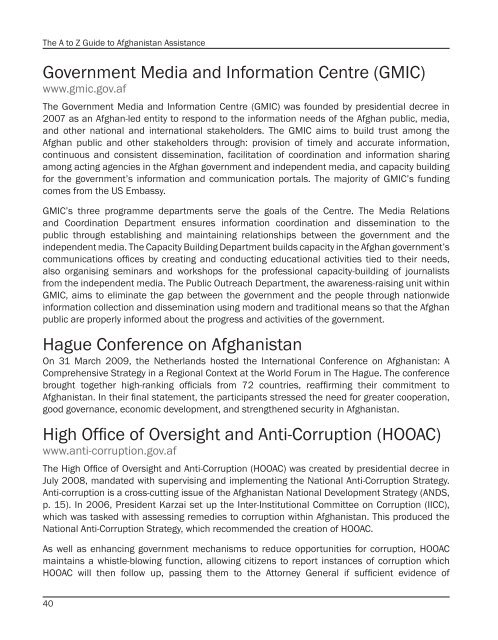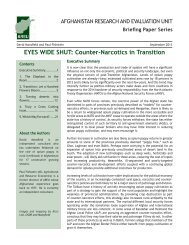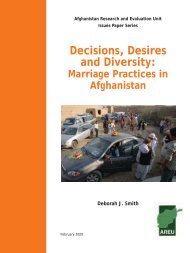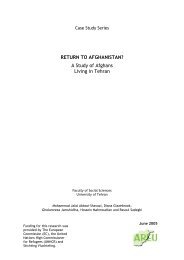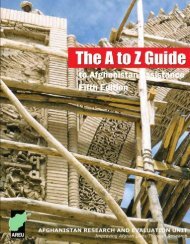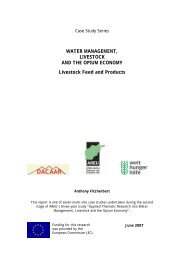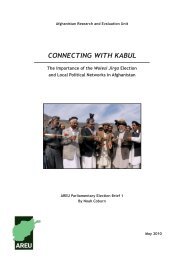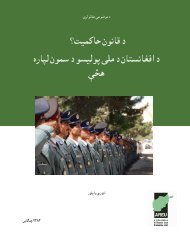A to Z Guide to Afghanistan Assistance 2012 - the Afghanistan ...
A to Z Guide to Afghanistan Assistance 2012 - the Afghanistan ...
A to Z Guide to Afghanistan Assistance 2012 - the Afghanistan ...
You also want an ePaper? Increase the reach of your titles
YUMPU automatically turns print PDFs into web optimized ePapers that Google loves.
The A <strong>to</strong> Z <strong>Guide</strong> <strong>to</strong> <strong>Afghanistan</strong> <strong>Assistance</strong><br />
Government Media and Information Centre (GMIC)<br />
www.gmic.gov.af<br />
The Government Media and Information Centre (GMIC) was founded by presidential decree in<br />
2007 as an Afghan-led entity <strong>to</strong> respond <strong>to</strong> <strong>the</strong> information needs of <strong>the</strong> Afghan public, media,<br />
and o<strong>the</strong>r national and international stakeholders. The GMIC aims <strong>to</strong> build trust among <strong>the</strong><br />
Afghan public and o<strong>the</strong>r stakeholders through: provision of timely and accurate information,<br />
continuous and consistent dissemination, facilitation of coordination and information sharing<br />
among acting agencies in <strong>the</strong> Afghan government and independent media, and capacity building<br />
for <strong>the</strong> government’s information and communication portals. The majority of GMIC’s funding<br />
comes from <strong>the</strong> US Embassy.<br />
GMIC’s three programme departments serve <strong>the</strong> goals of <strong>the</strong> Centre. The Media Relations<br />
and Coordination Department ensures information coordination and dissemination <strong>to</strong> <strong>the</strong><br />
public through establishing and maintaining relationships between <strong>the</strong> government and <strong>the</strong><br />
independent media. The Capacity Building Department builds capacity in <strong>the</strong> Afghan government’s<br />
communications offices by creating and conducting educational activities tied <strong>to</strong> <strong>the</strong>ir needs,<br />
also organising seminars and workshops for <strong>the</strong> professional capacity-building of journalists<br />
from <strong>the</strong> independent media. The Public Outreach Department, <strong>the</strong> awareness-raising unit within<br />
GMIC, aims <strong>to</strong> eliminate <strong>the</strong> gap between <strong>the</strong> government and <strong>the</strong> people through nationwide<br />
information collection and dissemination using modern and traditional means so that <strong>the</strong> Afghan<br />
public are properly informed about <strong>the</strong> progress and activities of <strong>the</strong> government.<br />
Hague Conference on <strong>Afghanistan</strong><br />
On 31 March 2009, <strong>the</strong> Ne<strong>the</strong>rlands hosted <strong>the</strong> International Conference on <strong>Afghanistan</strong>: A<br />
Comprehensive Strategy in a Regional Context at <strong>the</strong> World Forum in The Hague. The conference<br />
brought <strong>to</strong>ge<strong>the</strong>r high-ranking officials from 72 countries, reaffirming <strong>the</strong>ir commitment <strong>to</strong><br />
<strong>Afghanistan</strong>. In <strong>the</strong>ir final statement, <strong>the</strong> participants stressed <strong>the</strong> need for greater cooperation,<br />
good governance, economic development, and streng<strong>the</strong>ned security in <strong>Afghanistan</strong>.<br />
High Office of Oversight and Anti-Corruption (HOOAC)<br />
www.anti-corruption.gov.af<br />
The High Office of Oversight and Anti-Corruption (HOOAC) was created by presidential decree in<br />
July 2008, mandated with supervising and implementing <strong>the</strong> National Anti-Corruption Strategy.<br />
Anti-corruption is a cross-cutting issue of <strong>the</strong> <strong>Afghanistan</strong> National Development Strategy (ANDS,<br />
p. 15). In 2006, President Karzai set up <strong>the</strong> Inter-Institutional Committee on Corruption (IICC),<br />
which was tasked with assessing remedies <strong>to</strong> corruption within <strong>Afghanistan</strong>. This produced <strong>the</strong><br />
National Anti-Corruption Strategy, which recommended <strong>the</strong> creation of HOOAC.<br />
As well as enhancing government mechanisms <strong>to</strong> reduce opportunities for corruption, HOOAC<br />
maintains a whistle-blowing function, allowing citizens <strong>to</strong> report instances of corruption which<br />
HOOAC will <strong>the</strong>n follow up, passing <strong>the</strong>m <strong>to</strong> <strong>the</strong> At<strong>to</strong>rney General if sufficient evidence of<br />
40


